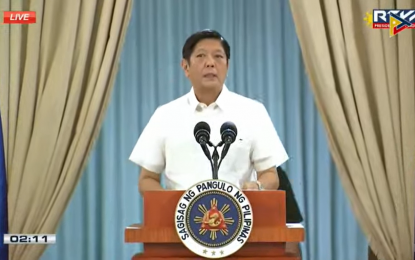
President Ferdinand “Bongbong” Marcos, Jr. (Screengrab from PTV-4)
MANILA – President Ferdinand Marcos Jr. on Wednesday announced his plan to visit quake-hit areas on July 28.
Marcos said he scheduled his trip to affected areas on Thursday, specifically in Abra province, to avoid disruptions to the delivery of local government units' (LGUs) service to quake victims.
"I am staying away from going to the affected areas for a very simple reason: It has been my experience as governor, it has been my experience in ‘Yolanda’ that when the national officers come to the affected areas immediately, ginugulo lang namin ‘yung trabaho ng mga local (we are disrupting the work of local governments)," Marcos said in a press conference.
"Let them (LGUs) do their work. Let us wait for them to tell us what the true situation is, and maybe I can schedule a trip perhaps tomorrow as soon as possible."
A magnitude 7 earthquake rocked Abra on Wednesday, the Philippine Institute of Volcanology and Seismology (Phivolcs) reported.
The tectonic quake, earlier logged at magnitude 7.3, struck 3 km. northwest of the municipality of Tayum at 8:43 a.m. It had a depth of 17 km.
In a Twitter post, Marcos said he has ordered the immediate delivery of relief assistance to the earthquake victims.
"Sa kabila ng nakalulungkot na mga ulat tungkol sa pinsalang dulot ng lindol, ating sinisigurado ang maagap na pagtugon sa mga pangangailangan ng ating mga kababayang apektado ng sakunang ito (Despite this sad news about the damage this earthquake has caused, we are assuring everyone of the immediate dispatch of assistance to our affected countrymen)," he said.
Monitoring possible aftershocks, landslides
Marcos said he is not letting his guard down, considering the dangers of possible aftershocks and landslides in the wake of the magnitude 7 earthquake.
He said he is keeping an eye on the identified areas that are at risk from aftershocks and landslides.
"We are watching out for, both in the structures and watching the dangers of landslides," Marcos said. "Huwag sanang umulan at least for the next two days para makapag-stabilize tayo, lalo na 'yung mga daan para ma-inspection na rin 'yung mga bahay (We are hoping that it will not rain for the next two days, so we can stabilize the affected areas to inspect the houses) if they are safe to go back to."
Marcos also advised the affected residents whose houses were damaged to stay in evacuation areas, until it is certain that there will be no aftershocks.
"Pero siguro, hindi pa ngayon dahil (Perhaps, it is still not safe to return) even if they (houses) are structurally safe to return, magkakaroon pa tayo ng aftershock. Baka doon naman magka-problema (That might cause a problem)," he said. "We have to explain to them that kailangan munang ma-inspeksyon ang kanilang mga bahay (that the inspection of their houses must come first)."
He made the statement, as he stressed the need to prevent further damages and loss of lives.
This, as he cited the magnitude 7.7 quake on July 16, 1990 in Baguio city in Benguet province where thousands of people died.
The 1990 earthquake also triggered landslides in Northern and Central Luzon.
Marcos also vowed to provide assistance to affected individuals.
"Tutulong kami siyempre, lalo na sa lindol, ang immediate concern ay shelter (Of course, we will help, especially now that the concern is shelter in the aftermath of the quake)," he said. "In the meantime, it is up to us, the government, to provide shelter for them, to be able to feed them while they are in the [temporary] shelters."
Bill creating disaster resilience dep't backed
In the aftermath of the powerful quake, Marcos expressed support for the passage of the bill creating disaster resilience department.
Marcos said the government needs to plan "for the future" and know "all the science and knowledge and the learnings on the mitigation of these kinds of disasters," given that the Philippines is a "disaster-prone" country.
"These are the things that we have to be careful. We need more capability than [what] we have now. Magaling na tayo sa bagyo. Marunong na tayo sa lindol pero (We know that earthquake occurs, but) the dangers, the effects of climate change are different. That's why we need a specialist agency," he said.
Lawmakers, including House Speaker Martin Romualdez, have filed a measure seeking the Department of Disaster Resilience will task the proposed department to ensure the country's disaster resilience.
The measure stresses that the "new normal" requires a more "focused and in-depth attention in the way we understand, prepare and respond to natural disasters."
Avoid building in 'dangerous' places
Marcos also stressed the need to balance "cost and mitigation requirements" of Republic Act 6541 or the National Building Code of the Philippines to ensure "safe" building of structures in the country.
The scope of RA 6541 includes “location, siting, design, quality of materials, construction, use, occupancy, and maintenance” of both private and public buildings.
Quizzed if there is a need to conduct regular inspection of buildings, including residential properties: "There is no need. There is already an existing procedure for that."
"I think the better way is to educate people na huwag kayong magtatayo ng bahay sa delikadong lugar at make sure na maayos ang mga materyales na ginagamit at maging matibay para sakaling magka-lindol o magka-bagyo ay hindi kayo mabiktima (that they should not build houses in dangerous areas and make sure that they use construction materials that can withstand earthquakes and typhoons)," Marcos added. (PNA)
